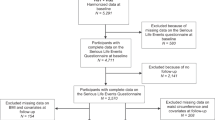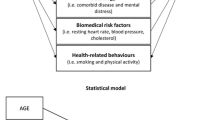Abstract
The aim of the study was to establish the effects of a range of psychosocial factors on weight changes and risk of obesity. The study population consisted of the 4,753 participants in the third (1991–1994) and fourth wave (2001–2003) of the Copenhagen City Heart Study, Denmark. At baseline the participants were asked comprehensive questions on major life events, work stress, vital exhaustion, social network, economic hardship, and intake of sleep medication. Weight and height were measured by health professionals. Weight changes and incident obesity was used as outcome measures. The participants on average gained 2 kg of weight and 8% became obese during follow-up. The experience of major life events in childhood, work life and adult life was associated with weight gain and obesity in women, but not in men. Vital exhaustion was associated with weight gain in a dose–response manner in men (P = 0.002) and younger women (P = 0.02). Persons with high vital exhaustion gained approximately 2 kg more during follow-up compared to those with no vital exhaustion. Women with high vital exhaustion were also more likely to become obese during follow-up (OR = 2.39; 95% CI: 1.14–5.03). There were no clear patterns in the associations between social network, economic hardship and weight gain or obesity. The number of psychosocial risk factors, as an indicator for clustering, was not associated with weight gain or obesity. In conclusion, major life events and vital exhaustion seem to play a role for weight gain and risk of obesity, especially in women.
Similar content being viewed by others
References
World Health Organization. Obesity: Preventing and managing the global epidemic. Report of a WHO Consultation. (WHO technical report series 894). World Health Organization: Geneva, Switzerland, 2000.
Savica V, Bellinghieri G, Kopple JD. The effect of nutrition on blood pressure. Annu Rev Nutr. 2010;30:365–401.
Mensah GA, Mokdad AH, Ford E, Narayan KM, Giles WH, Vinicor F, et al. Obesity, metabolic syndrome, and type 2 diabetes: emerging epidemics and their cardiovascular implications. Cardiol Clin. 2004;22:485–504.
Nguyen NT, Nguyen XM, Wooldridge JB, Slone JA, Lane JS. Association of obesity with risk of coronary heart disease: findings from the National Health and Nutrition Examination Survey, 1999–2006. Surg Obes Relat Dis. 2010;6:465–9.
Epel E, Lapidus R, McEwen B, Brownell K. Stress may add bite to appetite in women: a laboratory study of stress-induced cortisol and eating behavior. Psychoneuroendocrinology. 2001;26:37–49.
Newman E, O’Connor DB, Conner M. Daily hassles and eating behaviour: the role of cortisol reactivity status. Psychoneuroendocrinology. 2007;32:125–32.
Adam TC, Epel ES. Stress, eating and the reward system. Physiol Behav. 2007;91:449–58.
Torres SJ, Nowson CA. Relationship between stress, eating behavior, and obesity. Nutrition. 2007;23:887–94.
Overgaard D, Gyntelberg F, Heitmann BL. Psychological workload and body weight: is there an association? A review of the literature. Occup Med (Lond). 2004;54:35–41.
Block JP, He Y, Zaslavsky AM, Ding L, Ayanian JZ. Psychosocial stress and change in weight among US adults. Am J Epidemiol. 2009;170:181–92.
Rod NH, Gronbaek M, Schnohr P, Prescott E, Kristensen TS. Perceived stress as a risk factor for changes in health behaviour and cardiac risk profile: a longitudinal study. J Intern Med. 2009;266:467–75.
Ishizaki M, Nakagawa H, Morikawa Y, Honda R, Yamada Y, Kawakami N. Influence of job strain on changes in body mass index and waist circumference–6-year longitudinal study. Scand J Work Environ Health. 2008;34:288–96.
Kivimaki M, Head J, Ferrie JE, Shipley MJ, Brunner E, Vahtera J, et al. Work stress, weight gain and weight loss: evidence for bidirectional effects of job strain on body mass index in the Whitehall II study. Int J Obes (Lond). 2006;30:982–7.
Schnohr P, Jensen G, Lange P, Scharling H, Appleyard M. The Copenhagen City Heart Study—introduction. Eur Heart J Suppl. 2001;3:H1–83.
Appleyard M, Hansen AT, Jensen G, Schnohr P, Nyboe J. Copenhagen City Heart Study osterbroundersogelsen a book of tables with data from the first examination 1976–1978 and a five year follow-up 1981–1983. Scand J Soc Med. 1989;41:1–160.
World Health Organization. Global Database on Body Mass Index. Available at: http://apps.who.int/bmi. Accessed April 2010.
Holmes TH, Rahe RH. Social readjustment rating scale. J Psychosom Res. 1967;11:213–8.
Schuitemaker GE, Dinant GJ, van der Pol GA, Appels A. Assessment of vital exhaustion and identification of subjects at increased risk of myocardial infarction in general practice. Psychosomatics. 2004;45:414–8.
Appels A, Hoppener P, Mulder P. A questionnaire to assess premonitory symptoms of myocardial infarction. Int J Cardiol. 1987;17:15–24.
Akerstedt T, Knutsson A, Westerholm P, Theorell T, Alfredsson L, Kecklund G. Sleep disturbances, work stress and work hours—a cross-sectional study. J Psychosom Res. 2002;53:741–8.
Greenland S, Pearl J, Robins JM. Causal diagrams for epidemiologic research. Epidemiology. 1999;10:37–48.
Glymour MM, Greenland S. Causal Diagrams. In: Rothman, Greenland, Lash (eds). Modern Epidemiology. Wolters Kluwer: Philadelphia, 2008; p. 183–209.
Serlachius A, Hamer M, Wardle J. Stress and weight change in university students in the United Kingdom. Physiol Behav. 2007;92:548–53.
Van Strien T, Rookus MA, Bergers GP, Frijters JE, Defares PB. Life events, emotional eating and change in body mass index. Int J Obes. 1986;10:29–35.
Gunstad J, Paul RH, Spitznagel MB, Cohen RA, Williams LM, Kohn M, et al. Exposure to early life trauma is associated with adult obesity. Psychiatry Res. 2006;142:31–7.
Rookus MA, Burema J, Frijters JE. Changes in body mass index in young adults in relation to number of life events experienced. Int J Obes. 1988;12:29–39.
Bryant MJ, Stevens J, Truesdale KP, Mosley T, Chambless L. Obesity and vital exhaustion: analysis of the atherosclerosis risk in the communities study. Obesity (Silver Spring). 2008;16:1545–51.
Huijbrechts IP, Erdman RA, Duivenvoorden HJ, Passchier J. Modification in Quetelet index five months after myocardial infarction: relevance of biographic and personality characteristics. Prev Med. 1999;28:86–91.
Prescott E, Godtfredsen N, Osler M, Schnohr P, Barefoot J. Social gradient in the metabolic syndrome not explained by psychosocial and behavioural factors: evidence from the Copenhagen City Heart Study. Eur J Cardiovasc Prev Rehabil. 2007;14:405–12.
Anderson AS, Marshall DW, Lea EJ. Shared lives-an opportunity for obesity prevention? Appetite. 2004;43:327–9.
The NS, Gordon-Larsen P. Entry into romantic partnership is associated with obesity. Obesity (Silver Spring). 2009;17:1441–7.
Ball K, Crawford D. Socioeconomic status and weight change in adults: a review. Soc Sci Med. 2005;60:1987–2010.
Greeno CG, Wing RR. Stress-induced eating. Psychol Bull. 1994;115:444–64.
Epel E, Jimenez S, Brownell K, Stroud L, Stoney C, Niaura R. Are stress eaters at risk for the metabolic syndrome? Ann N Y Acad Sci. 2004;1032:208–10.
van Diest R, Appels A. Vital exhaustion and depression: a conceptual study. J Psychosom Res. 1991;35:535–44.
Acknowledgments
We thank the staff and the participants of the Copenhagen City Heart Study. This work was supported by the Danish Medical Research Council [09-062115 to L.B.I and N.H.R.]. The Copenhagen City Heart Study is supported by funds from the Danish Heart Foundation and the Lundbeck Foundation.
Conflicts of interests
None declared.
Author information
Authors and Affiliations
Corresponding author
Rights and permissions
About this article
Cite this article
Iversen, L.B., Strandberg-Larsen, K., Prescott, E. et al. Psychosocial risk factors, weight changes and risk of obesity: the Copenhagen City Heart Study. Eur J Epidemiol 27, 119–130 (2012). https://doi.org/10.1007/s10654-012-9659-9
Received:
Accepted:
Published:
Issue Date:
DOI: https://doi.org/10.1007/s10654-012-9659-9




